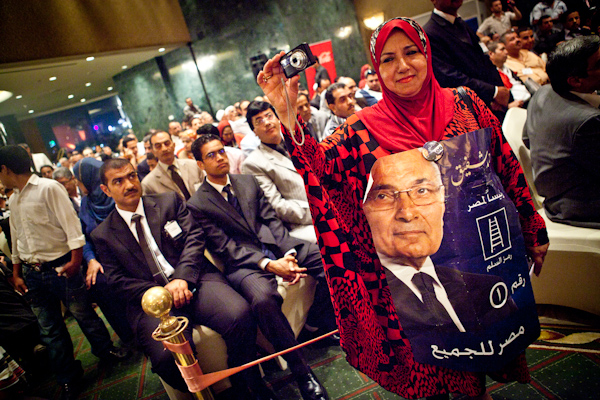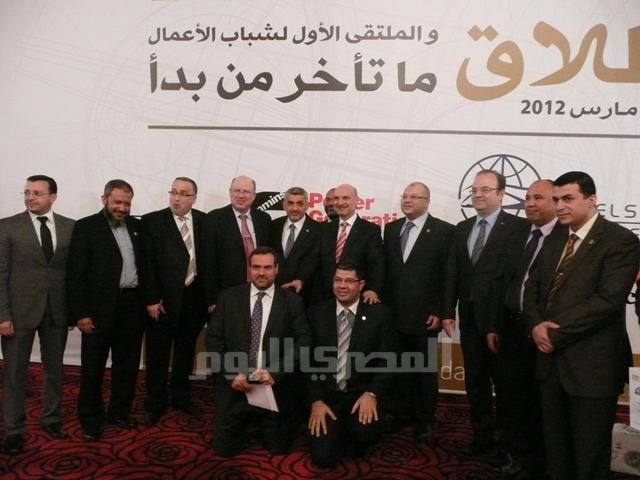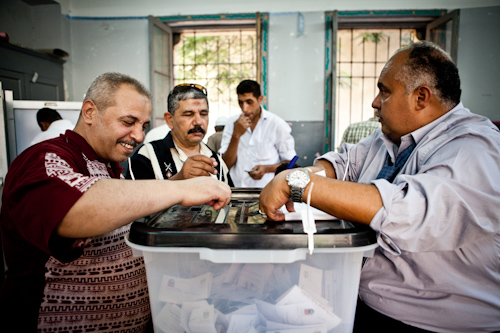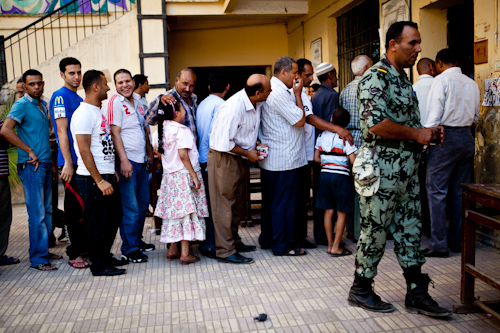
It was only a matter of time before the candidates in Egypt’s first post-Hosni Mubarak presidential race started taking swings at each other. Throughout the race, it has often seemed more about exchanging personal attacks than any concerted strategy.
And in the last days before Egyptians take to the polls, things are heating up.
In recent weeks, attacks and accusations have flown. They’ve been uttered at rallies, on the campaign trail, and in press interviews. Professional and personal realms are often blurred in Egyptian society, and politics have proven to be no different.
“It is personal,” says professor of Mass Communications at the American University in Cairo Naila Hamdy. “Some of them have been in prison and bear grudges because of that. Others were in government and bear grudges against the candidates who are considered revolutionary. It is a reflection of the country right now, where everyone takes things in this personal manner, so why would candidates be any different?”
There has been no negative ad campaigning against specific rivals, as happens in American politics, besides a vague allusion in a cartoon ad for Ahmed Shafiq that he is not an “agent”, possibly inferring that all his rivals are.
Shafiq has proven to be the most prolific attacker, always on the defensive for being the closest candidate to the former regime. Shafiq served as the last prime minister under Mubarak and minister of civil aviation.
Shafiq’s defensive strategy is to take down others with him, not just rival candidates but their backers too.
Most recently, he stated that the Muslim Brotherhood also served under the Mubarak regime, by having 88 opposition MPs in the 2005 parliament.
Sensitivities over backgrounds have also come into play, and many candidates don’t seem to be above inherent pettiness.
Again Shafiq is the main culprit, mainly because he is most frequently under attack.
In reference to frontrunner Abdel Moneim Abouel Fotouh he recently said, “Is it conceivable that since I graduated from university up until I turned 60, my entire history is handing out blankets?”
Abouel Fotouh is head of the Arab Doctors Union, which carries out aid campaigns throughout the region.
But it’s not just Shafiq, at one point all of the prominent candidates have taken a cheap shot or two.
Abouel Fotouh – being a doctor – said he was aware that some of the other candidates did not meet health requirements, alluding that one of the candidates had Hepatitis.
Speculation was that it was Hamdeen Sabbahi, who responded by turning into his favor, stating that he had contracted the common parasite Bilharzia, “like all Egyptians,” and had contracted Hepatitis C as a result of treatment injections.
Amr Moussa also seems to be comfortable taking hits at his rivals, preferring to attack the Islamist candidates, Abouel Fotouh, Mohamed Morsy and Mohamed Selim al-Awa all in one shot.
He has said on more than one occasion that because they acquiesce to a specific Islamic reference, they will adhere to it even if that goes against the interests of the country.
During the debate between him and Abouel Fotouh he bristled when his opponent labeled him as affiliated with the Mubarak regime, while he languished in jail under the same regime.
The former foreign minister responded by highlighting Abouel Fotouh’s Islamist background and an alleged claim that he once espoused violence.
Beyond critiquing candidates’ histories, negative campaigning has also surrounded promised policies.
Moussa laid into Sabbahi over comments the latter had made about removing Field Marshall Hussein Tantawi if he became president, which Moussa described as ploy to play on peoples’ emotions.
Not to be left behind, Awa came out with quite a zinger. He accused some of the candidates of accepting foreign funding from abroad, whether from the Gulf or the West. He did not specify whom he was referring to, which means the allegation applied to all those competing in the race.
Even revolutionary candidate Khaled Ali has not abstained from a little disparagement of his rivals, but in his case it’s more about policy rather than personal attacks.
He has said that his decision to run forced other candidates to focus on their platforms, when up until then they were more focused on catering to voters through public rallies. He also said that Abouel Fotouh, Moussa and Morsi refused to debate him on air for fear of his strong program and speaking skills.
But how this to-and-fro between the candidates actually effects voters is another matter.
“I don’t think it works, and it might be counterproductive,” said Hamdy. “Decisions in this election will be based on ideology, so people have made up their minds and the choices aren’t that many. Even undecided voters are trying to decide between a narrow range of candidates.”
This election and candidates’ tactics are all part of a national learning process, according to Hamdy.
“Initially it was perceived that people are naïve and negative campaigning might win over voters, but people are more conscious about these things,” he said.




